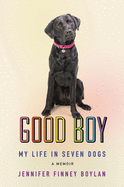
Jennifer Finney Boylan tells her life story with both sweetness and fierceness in Good Boy: My Life in Seven Dogs. A coming-of-age story, a tale of finding and owning of self, and an elegy to a series of delightful and frustrating mutts, this is an occasionally heartbreaking but ultimately feel-good memoir about life and love.
Boylan's 2003 memoir, She's Not There, about her trans experience, was the first bestselling book by a transgender American author. Good Boy differs in several particulars: for one, there are dogs. "This is a book about dogs: the love we have for them, and the way that love helps us understand the people we have been." It follows the path of Boylan's life, from a confused and troubled boyhood through various teen and young adult phases, to dating and marriage, and finally to the decision to transition and the recent happy years as wife and mother to two young adults. Through these years and epochs, seven dogs in particular helped Boylan mark time and observe change, and learn to love.
First came Playboy, "a resentful hoodlum who loved no one except my father." He chases and attacks motorcycles and is happy to raise a leg or squat indoors. "My father thought this was kind of funny, but then he was never the person who had to clean it up." (That person was Boylan's mother, and she would continue the unenviable task of cleaning up for several dog lifetimes to come.)
Then there was Penny, aka Sausage. What eventually turned out to be a thyroid problem caused this Dalmatian puppy to grow enormously fat, but the young Boylan (at this point known as Jimmy) carries her around "like an unusually heavy rag doll." Boylan loves her, despite the dog's indifference. "I figured, if I kept being sweet to Penny all the time, eventually her heart would open, and she would love me as I loved her. No one told me this is never how it works."
Matt the Mutt humps everything and everyone, human and non, and knocks people down as they enter the house. Despite being neutered, Matt has lots of sex with Sausage, while James--now in college--mostly avoids it, even though he has opportunities with female classmates.
Next comes Brown, whose perfectly plain (if descriptive) name the Boylans hoped would match a personality boringly normal and sane, as none of their dogs had been to date. But all Brown wants to do is eat her own paws, and so she must spend her days in the Cone of Shame, meant to protect her from herself. "Was Brown not so unlike me, driven to the ends of the earth simply because she could not quite do the thing that she was destined to do?"
Alongside the lives of these dogs, young Boylan wrestles with deeply hidden anxieties--about how well he belongs in "his" body, in an all-boys school, in the world he's been assigned. James's mother is a martyr to dog poop, and his father battles cancer. On his deathbed, Boylan Sr. tells his son, "Be the man." That, of course, is the task James most struggles with.
Boylan describes herself as a gender immigrant, as having a life divided into more or less equal thirds: boyhood, manhood, womanhood. (Boylan makes clear that while some trans people would not use such terms, she does see the earlier parts of her life as belonging to a person others perceived as a boy and, later, a man.) Good Boy is in part a contemplation of these themes: What does it mean to be a man? Is it tied to one's ability to change the oil in the car, build things, woo women?
In adulthood, Boylan meets the woman she will marry, and they receive from their best man and childhood friend a dog that he can no longer care for. Alex is Boylan's "guardian angel" and a "unique scholar," apparently the first well-behaved dog to belong to a Boylan, but one who never gets over the loss of his first owner.
Happily married James adopts a "golden retriever" puppy that turns out to be anything but. This vaguely yellow mutt, Lucy, serves as witness to the beginnings of Boylan's transition, finding herself and becoming Jenny. Initially distressed by the sight of her owner in dress, heels and wig, Lucy eventually counsels Jenny (in imagined dialogue) that, rather than losing everything, "Some things you will keep."
Finally, Ranger is the dog of Boylan's happy, settled life, a loyal black lab with a troublesome inability to avoid porcupines. In these later years, the author reflects on how well her conservative mother had handled her coming out, and Boylan herself must consider how to be the best mother she can be when one of her own children has news to share. Happily, well-adjusted Ranger is there to counsel the whole family as Boylan's children grow up.
The mature woman who has penned Good Boy has much to reflect upon and lessons to share, many of them couched in the lives of good (and troubled) dogs. "There'd been this puppy I'd loved when I was eleven, but in time I'd turned my back on her, thrown my dog out of bed because her gelatinous sadness was a merciless chain tying me to the person I no longer wished to be." Boylan's dogs have taught her about love, and how its unconditional nature flows between humans and dogs. Good Boy is a story, first and foremost, about love, its many forms and the many directions in which we point it and receive it, and about how certain details, like gender, really matter very little in the end. If you have a family--and a dog--that love you, that's the vital thing. --Julia Kastner

